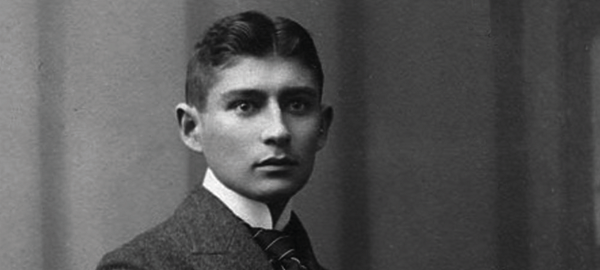THIS WEEK’S MUSE
FRANZ KAFKA

“Don’t bend; don’t water it down; don’t try to make it logical; don’t edit your own soul according to the fashion. Rather, follow your most intense obsessions mercilessly.”
Franz Kafka was a German-speaking writer who, though published very little during his lifetime, is today widely regarded as a major figure of 20th-century literature.
Born in 1883 in Prague–now the capital city of the Czech Republic but then the largest city in Bohemia—Kafka became an obsessive writer from an early age. As the opening quote attests, he had an uneasy and intense relationship with the process.
He was caught in a spiral, but he had to write. He wrote stories and fiction, but he was also writing about himself and his world – to better understand both. “A non-writing writer,” he said, “is a monster courting insanity.” Yet, the very act of writing and the things it revealed seems to have caused him torment, provoking the need for further analysis. The search was endless, self-perpetuating, and—to Kafka at least—self-defeating.
“I am constantly trying to communicate something incommunicable, to explain something inexplicable, to tell about something I only feel in my bones and which can only be experienced in those bones.”
Whatever the origin of this spiral, he placed little value on what he wrote and was rarely satisfied with what he produced, often speaking of his internal struggle. “I am a cage, in search of a bird,” he once wrote. “Writing is utter solitude, the descent into the cold abyss of oneself.”
The modernist movement of the late 19th century—provoking a rejection of contemporary artistic conventions and styles—had gathered momentum in Prague, and Kafka’s work has embedded within it the movement’s influence. His stories are extraordinary and strange, his characters complex and complicated, his narrative situations are often fantastic, absurd, and humorous, but always unsettling.
What gives Kafka an edge is that he wrote these astonishing ideas in a very ordinary way. In his short story The Metamorphosis, for example, Kafka describes the transformation of a man into an insect.
He developed the idea in careful detail, and the narrative around it—that of family life and work—is very normal. Basing the story in a matter-of-fact style, as an everyday tale, the reader readily accepts the situation. A believability that runs through this utterly unbelievable story. It cannot occur, yet we accept it.
Kafka’s dissatisfaction with his own writing ran deep, personally destroying most of his work. He also demanded that anything left after his death was also to be destroyed. “Everything I leave behind me,” he wrote to friend and author Max Brod, “in the way of diaries, manuscripts, letters (my own and others’), sketches, and so on, [is] to be burned unread.”
It is largely because Brod ignored this request that we know Kafka today. Almost a century after his—largely anonymous—death, he occupies a position of literary and critical acclaim. His success, ironically, is in part due to that which he struggled with throughout his life.
Of balancing realism and fantasy within his writing. Isolating protagonists facing bizarre or surrealistic predicaments caused by government and bureaucracy and creating a narrative that a reading public could identify with. This has come to define his style. Kafkaesque.
“A book should serve as the axe for the frozen sea within us.”
HAPPENING
AWAKENING YOUR CHAKRAS

Four Tuesdays, beginning September 13, from 1–3pm
With Nancy Lord
Discover meditation with instruction on the Chakra body field.
$112 – Member, $128 – Non-Member
